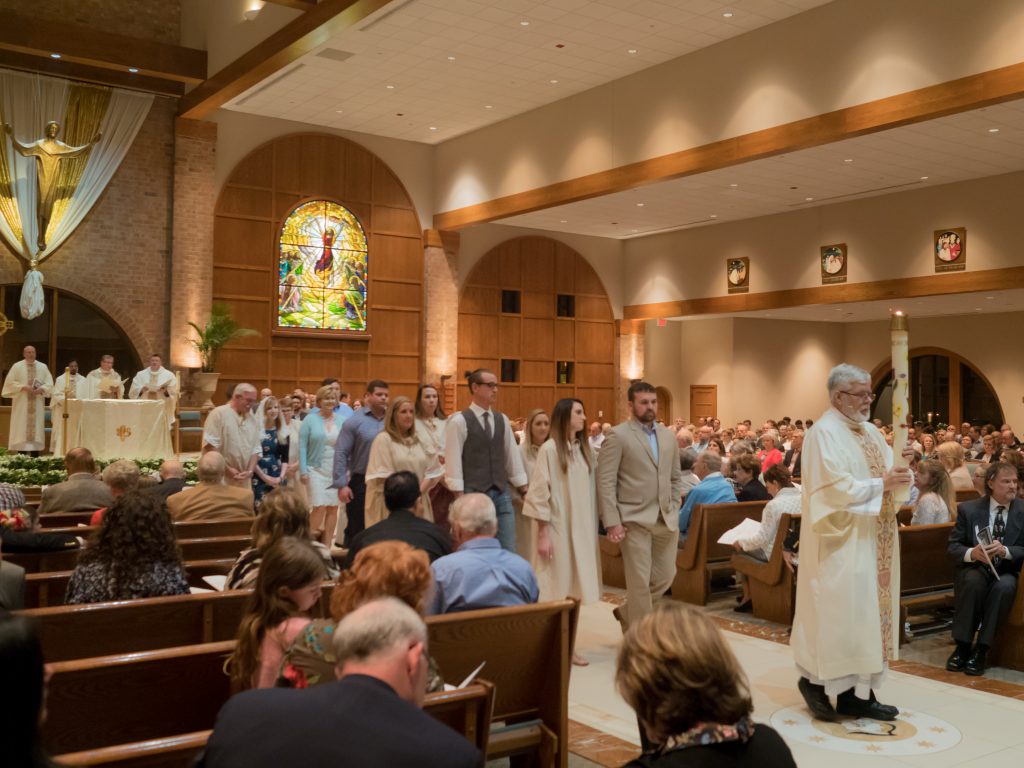“Jesus spoke to them again, saying, ‘I am the light of the world. Whoever follows me will not walk in darkness, but will have the light of life.'” – John 8:12
What is RCIA?
The Rite of Christian Initiation of Adults is a restoration of an ancient process for incorporating unbaptized persons into Jesus Christ through the sacraments of Baptism, Confirmation, and Eucharist. In this journey of faith formation, candidates and catechumen (people not yet baptized) are accompanied by members of the community as they learn more about the Catholic faith. For more information, check out the page entitled “What is RCIA?”
Who needs to attend RCIA faith formation classes??
People who have not received the sacrament of Baptism must attend faith formation classes for an extended period — ideally, a year, and preferably longer. The length of the process depends greatly on your readiness for the reception of Baptism, Confirmation, and Eucharist.

I’m already baptized in another denomination. Do I need to attend RCIA faith formation classes?
Most Christians will not be re-baptized since the Catholic Church recognizes the baptism of most Christian denominations. If you are already baptized, you will need to learn how the beliefs and practices you grew up with differ from the beliefs and practices of the Catholic Church. If you are a baptized and confirmed Catholic returning to the practice of the faith, you should talk to the pastor or the RCIA director about how to proceed.
I think I was baptized, but am not sure. What kind of information do I need to join the Catholic Church?
If your church or congregation kept records, you’ll need to obtain a copy of your baptismal record — a certificate or a letter from the pastor there. Because locating records can be difficult or time-consuming, you should try to obtain these records as early in the process as possible. We must see these records to confirm your baptismal status before you’re received into the Church. If your church or congregation did not keep records or no longer exists, we can make other arrangements. Please contact the RCIA director for more information.
I’ve been divorced but am not remarried. Can I become Catholic?
Unless you plan to marry, you do not need to obtain an annulment. Please talk to the RCIA director to see if you need an annulment.
I’ve been divorced and am remarried, and my spouse is divorced and remarried. Can I become Catholic?
You and your current spouse need to begin the annulment process, and you should begin it as soon as possible even if your spouse is not considering entry into the Church. Please contact the RCIA director for information on how to proceed. Of course, you can attend RCIA instructions while the annulment process is ongoing.
What’s the cutoff date for beginning faith formation classes and receive the sacraments?
Currently, faith formation classes start the first Sunday after Labor Day. Unbaptized persons who have had no previous religious instruction should participate in faith formation classes and experiences for at least a year, possibly longer. Inquiry and faith formation experiences can begin at any time during the year. Unbaptized persons are encouraged to begin inquiry in April. If such people join later, they may have to wait until Easter of the following year to be baptized. The length of the process for unbaptized and baptized seekers will vary and will depend greatly on your readiness for the reception of Baptism, Confirmation, and Eucharist. Please talk to the RCIA director.
When do you meet?
All people seeking Baptism at Our Lady of the Lake will meet on Sunday mornings from 9:40- 10:45 AM. Many baptized persons will also attend Sunday mornings, but the formation process may be different due to your individual needs. Please talk to the RCIA director.
How long does faith formation last?
Inquiry is designed to help you decide whether you want to continue, since choosing to be baptized or received into the Catholic Church is a serious decision and requires commitment. Formal faith formation classes begin in early September and meet weekly until Pentecost (6 weeks after Easter.)
Please note that Baptism of adults normally occurs at the Easter Vigil (Saturday night before Easter.) Baptized persons who are being received into the Catholic Church or who are completing their Sacraments of Initiation may receive Confirmation and Eucharist at Easter Vigil or at another suitable time (after discussion with the RCIA director.)
My schedule doesn’t permit me to attend your sessions. What should I do?
There are a couple of options. We may be able to arrange catechesis in a different format. Also, other parishes meet at different times, and you may prefer to attend one of them. We can provide information on when and where other parishes in the area offer instruction.
I heard I need a sponsor in order to become Catholic. What is that, and how do I get one?
A sponsor is a practicing Catholic in good standing with the Church who accompanies you on your journey through RCIA. The sponsor has the job of helping you through the process, and of verifying at the main rites that you are ready to take the next step. For baptism, the sponsor is called a “godparent,” with more serious responsibilities toward the catechumen being sponsored.At Our Lady of the Lake, sponsors are expected to attend sessions with the candidate they are sponsoring. If you know someone who meets these criteria, you can simply ask them to sponsor you. If you don’t know anyone, the parish will provide a sponsor for you.
I know who I want my sponsor to be, but that person doesn’t live locally and can’t attend sessions. Can that person still be my sponsor?
Yes. However, we will provide someone locally to represent that sponsor, accompany you on an ongoing basis and instructions and the rites with you. At the Easter Vigil, the sponsor you prefer will then stand in the local person’s place as your official sponsor.
How old should a person be to attend RCIA?
A person should be old enough to understand what is being taught. For children of catechetical age (ages 7 to 14), we encourage students to enroll in religious education. Depending on their level of maturity and interests, older teens might join the adult group. Please contact the RCIA director for more information.
What texts do you use and how do I get them?
We use the Scriptures, the Catechism of the Catholic Church and Ligouri Press’s Catholic Update as our primary resources. If you have a Bible of your own, please bring it. We would like you to own a Catholic edition of Scripture, so we will provide it. We also provide the Catechism. Both are free of charge. We provide other materials — a syllabus of subjects covered, handouts, and occasionally printed materials, as well. We also provide a notebook for your handouts.

